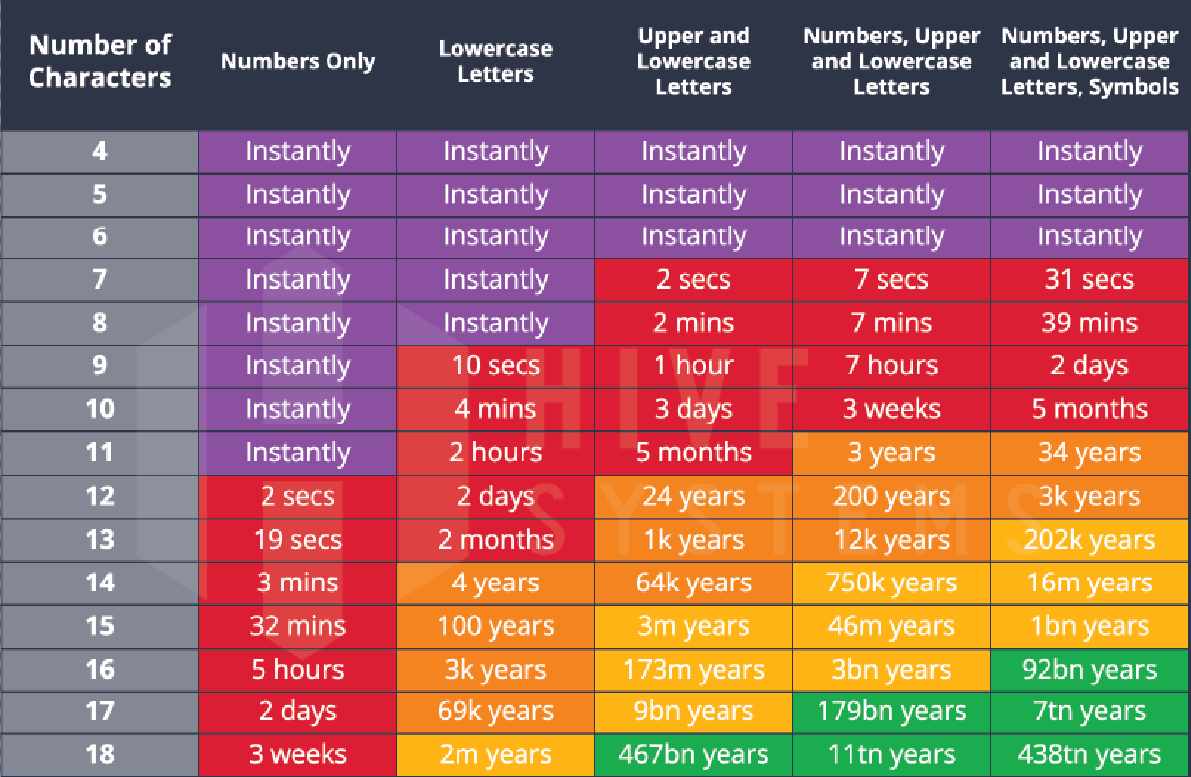5 ways you will lose your password
It’s a string of characters. How can you ever lose it? You can write it down a notebook or a piece of paper and shove it within page 47 of the yellow book on your shelf. Ok, you cannot lose your password. But you can lose it’s secrecy trait, and that’s about the same.
We lose things all the time like the remote and our keys. Sometimes we lose our phones. You may have written down your password on your desktop and misplaced it or simply sent it to your mother via chat, hoping to be able to retrieve it later. Well, that means losing it too.
So here’s a few ways you’ll lose your password.
1. You’re using a common password
According to Hive Systems, your password may take shorter amount of time to crack than you may think:

Hackers have immense lists of common passwords (e.g. NordVPN list) that render your password crackable immediately. Check this chart and consider upgrading yours today by following these rules. A password within the yellow zone should be good enough.
2. You continue to reuse your password in different websites
This is not the first time you listen that passwords should be different for each webpage; but you still haven’t solved this issue across all of your accounts. They’re all to many, right?
Remember that a system security is as strong as it’s weakest link. If you have several accounts under the same email, and your password has been leaked at some point, then all of your other accounts are in danger.
It’s all too easy to reuse a password, so its way easier for attackers. “Yeah, this user MySpace profile password is 1234. But they don’t use MySpace anyway… wait. let’s try it within amazon login… It worked!”. And this hacker has now access to your credit card.
3. You’ve shared your password
“My partner/mother/son wouldn’t every betray me!” - We’ve all thought this at some time, and we may be right. But they are humans and we make mistakes. They may lose the post-it where it’s written, or take a screen shot which got stolen at the school mobile phones hack.
59% of USA internet users have shared their password. Source.
Keep this information to yourself. And if you have to share it, replace it as soon as possible.
4. You are predictable
We’ve all known a banking or retail service that makes you replace your password once a month or so. While password rotation is a great practice, this is taking the password management rules to stupidity. Numbers talk, not just me: this encourages users to use a series of predictable changes to their passwords. A few examples:
- happytree
- happytree2
- happytree3
- …
If you’ve thought of doing a simple edit to your previous password, then stop.
5. You refuse to change your password
A regular change of password defeats several of the common vulnerabilities users tend to have. You shared a password in the past? It’s no longer valid. You wrote it down in a notebook that got stolen? It’s no longer valid. You were not aware of a better password creation a few months ago? You can now create a better one. Just by changing the password regularly.
A study in 2020 by the European Commission, states that about 30% of people did not change their passwords during the last 12 months, and another 10% is not even aware of doing so or not. It doesn’t take much to be safe, in this case, just stay within the 60% of people and you’ll be safer.